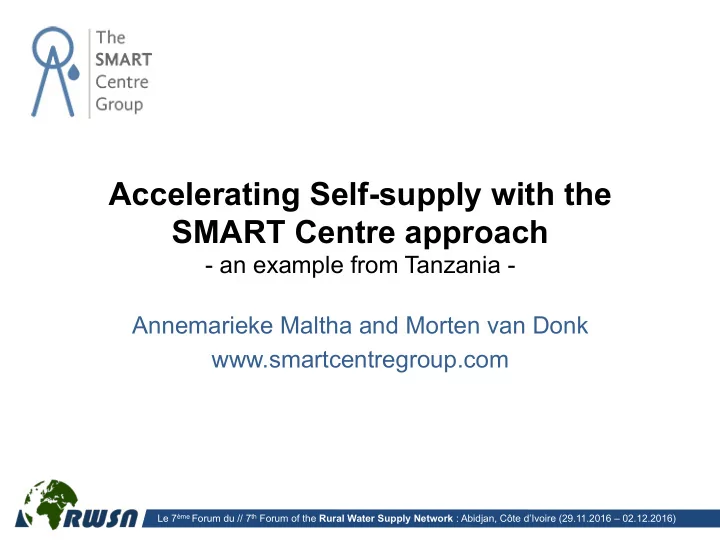

Accelerating Self-supply with the SMART Centre approach - an example from Tanzania - Annemarieke Maltha and Morten van Donk www.smartcentregroup.com Le 7 ème Forum du // 7 th Forum of the Rural Water Supply Network : Abidjan, Côte d’Ivoire (29.11.2016 – 02.12.2016)
Objective • Reach sustainable water supply in Tanzania also in small communities or at family level • Where machine-drilled boreholes are too expensive • Create supply chains of affordable technologies for Self- supply, produced and sold by local private sector Le 7 ème Forum du // 7 th Forum of the Rural Water Supply Network : Abidjan, Côte d’Ivoire (29.11.2016 – 02.12.2016)
SMART Centre approach Simple, Market-based, Affordable, Repairable Technologies • SHIPO SMART Centre Tanzania since 2003 – Training and knowledge transfer of around 20 SMARTechs – 35 succesful entrepreneurs producing and selling quality products – 10.000 installed Rope pumps: 5000 for Communal supply and 5000 for Self- supply in rural and peri-urban areas • Can Self-supply help to reach the goal of access for all? Le 7 ème Forum du // 7 th Forum of the Rural Water Supply Network : Abidjan, Côte d’Ivoire (29.11.2016 – 02.12.2016)
Case study on Self-supply • Assessment of the supply chain – Businesses, entrepreneurs – Technologies fit for Self-supply, SMART wells and pumps – MoIvaIons and needs of Self- supply water users • What are the challenges to accelerate scale-up? Le 7 ème Forum du // 7 th Forum of the Rural Water Supply Network : Abidjan, Côte d’Ivoire (29.11.2016 – 02.12.2016)
The entrepreneur (1) • His customers are – NGOs, for (subsidised) rural communal supply – Families (1) Peri-urban families with communal supply invest in an own well and pump (2) Rural families, less money, buy a pump between 2 or 3 families • Wells and Rope pumps important part of his business: income and job creation • Supply Chain of materials relatively well developed, bulk supplies from Dar es Salaam Le 7 ème Forum du // 7 th Forum of the Rural Water Supply Network : Abidjan, Côte d’Ivoire (29.11.2016 – 02.12.2016)
The entrepreneur (2) • Marketing is bottom-up: Satisfied users and critical mass • Limitations to scale up – Limited business skills / markeIng skills – No strategy how to grow, approach new customers – Few companies doing very well – Insufficient capital prohibits smaller companies to grow Le 7 ème Forum du // 7 th Forum of the Rural Water Supply Network : Abidjan, Côte d’Ivoire (29.11.2016 – 02.12.2016)
The water user (Self-supply) • 80% of the pumps for Self-supply sold to peri-urban families, middle class and top of BoP (teachers, shop owners, company owners, larger farmers) • 95% of the families paid upfront, 5% via microcredit (SACCOS) • Sales via examples at neighbours, health clinics, family, demonstration models at entrepreneur Le 7 ème Forum du // 7 th Forum of the Rural Water Supply Network : Abidjan, Côte d’Ivoire (29.11.2016 – 02.12.2016)
Motivation to invest in Self-supply • Convenience: reliable water source nearby, abundant water • Independency from neighbours • Avoid waiting time at communal water supply • Communal water supply, piped system often not functioning • Easy handling, low maintenance costs, affordable • Domestic and productive use – IrrigaIon – Watering animals – Water sales – ConstrucIon Le 7 ème Forum du // 7 th Forum of the Rural Water Supply Network : Abidjan, Côte d’Ivoire (29.11.2016 – 02.12.2016)
Sustainability of Self-supply • Maintenance costs of Rope pumps were few and affordable • 92% of the private wells / Rope pumps were functional at date of interview • Users did small repairs themselves (ownership), spare parts for Rope pumps were easily available. • Up to 35 households used 1 family pump. Water was mostly provided for free to other families • Pumps sold by local companies, no interference of an NGO Le 7 ème Forum du // 7 th Forum of the Rural Water Supply Network : Abidjan, Côte d’Ivoire (29.11.2016 – 02.12.2016)
Conclusions / Recommendations Accelerate scaling up of rural water supply with low cost technologies possible via a market-based approach with actions; – Create a criIcal mass in new areas – Expand training entrepreneurs, include training in VocaIonal educaIon – Provide long term follow up on quality, technical and business skills – Facilitate entrepreneurs in access to capital, social markeIng – Awareness, show families economic benefits and convenience of Self-supply – Add other inclusive business models to enable Self-supply for poorer families Le 7 ème Forum du // 7 th Forum of the Rural Water Supply Network : Abidjan, Côte d’Ivoire (29.11.2016 – 02.12.2016)
With thanks to All interviewed entrepreneurs and families, Morten van Donk, Henk Holtslag, Eelco van der Pal, Eugenia Kimaro, André Olschewski, Nanda Buis and SHIPO SMART Centre Le 7 ème Forum du // 7 th Forum of the Rural Water Supply Network : Abidjan, Côte d’Ivoire (29.11.2016 – 02.12.2016)
Recommend
More recommend